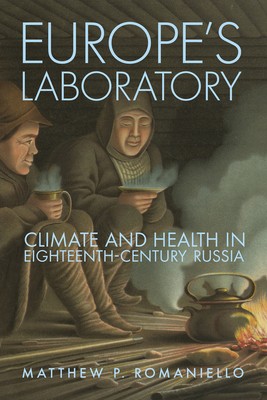
- We will send in 10–14 business days.
- Author: Matthew P Romaniello
- Publisher: Northern Illinois University Press
- ISBN-10: 1501783920
- ISBN-13: 9781501783920
- Format: 0 x 0 x 0 cm, kieti viršeliai
- Language: English
- SAVE -10% with code: EXTRA
Reviews
Description
Europe's Laboratory is a history of eighteenth-century naturalists and physicians, who were involved in the creation of a classification system for the people of the Russian Empire. These Enlightened scholars traveled through Russia describing its people, landscape, and customs. In an era when climate was seen as a signficant factor affecting health and bodies, these men wondered: how did the Russians, a "cold" people--phlegmatic or melancholic, according to humoral theory--manage an empire?
Russia's empire, as Matthew P. Romaniello shows, contradicted the medical knowledge reflecting centuries of experimentation and practice. In solving this riddle, naturalists and physicians would unlock the secret of Russia's success and create a typology of imperial bodies, a guide toward managing the empire's diversity, to prepare Russia for greater successes in the nineteenth century. Rather than an underpopulated region of unambitious people, eighteenth-century Russia was a dynamic empire that mastered skills to support settler colonialism in climates unfamiliar to other Europeans. Europe's Laboratory makes a significant contribution to the most understudied era of Russian history while engaging the broader, global debates on the formation of race theory in colonial contexts.
EXTRA 10 % discount with code: EXTRA
The promotion ends in 23d.12:31:47
The discount code is valid when purchasing from 10 €. Discounts do not stack.
- Author: Matthew P Romaniello
- Publisher: Northern Illinois University Press
- ISBN-10: 1501783920
- ISBN-13: 9781501783920
- Format: 0 x 0 x 0 cm, kieti viršeliai
- Language: English English
Europe's Laboratory is a history of eighteenth-century naturalists and physicians, who were involved in the creation of a classification system for the people of the Russian Empire. These Enlightened scholars traveled through Russia describing its people, landscape, and customs. In an era when climate was seen as a signficant factor affecting health and bodies, these men wondered: how did the Russians, a "cold" people--phlegmatic or melancholic, according to humoral theory--manage an empire?
Russia's empire, as Matthew P. Romaniello shows, contradicted the medical knowledge reflecting centuries of experimentation and practice. In solving this riddle, naturalists and physicians would unlock the secret of Russia's success and create a typology of imperial bodies, a guide toward managing the empire's diversity, to prepare Russia for greater successes in the nineteenth century. Rather than an underpopulated region of unambitious people, eighteenth-century Russia was a dynamic empire that mastered skills to support settler colonialism in climates unfamiliar to other Europeans. Europe's Laboratory makes a significant contribution to the most understudied era of Russian history while engaging the broader, global debates on the formation of race theory in colonial contexts.


Reviews